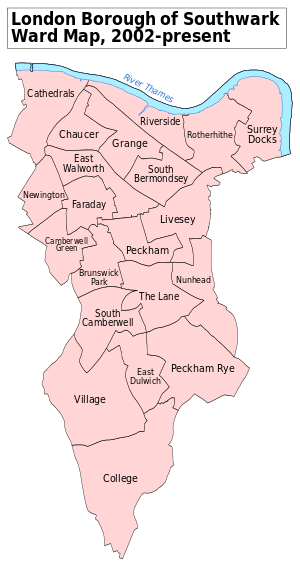Southwark London Borough Council
| Southwark London Borough Council | |
|---|---|
 | |
| Type | |
| Type | |
| Structure | |
| Seats | 63 councillors |
 | |
Political groups |
Executive (48)
Opposition (15)
|
| Elections | |
| First past the post | |
Last election | 22 May 2014 |
Next election | May 2018 |
| Meeting place | |
 Town Hall, Peckham Road, Peckham | |
| Website | |
|
www | |
Southwark London Borough Council is the local authority for the London Borough of Southwark in Greater London, England. It is a London borough council, one of 32 in the United Kingdom capital of London.
History

The London Borough of Southwark (LB Southwark) was created on 1 April 1965 under the London Government Act 1963 at the same time as the Greater London Council and is a type of local government district. It is one of the twelve London boroughs designated as an Inner London borough. As with the other London boroughs, LB Southwark was created by combining groups of former local government units, many of which had previously been established under the auspices of the London County Council or other outer London authorities. A review undertaken between 1987 and 1992 led to a number of relatively small alterations in borough boundaries. A list of previous local authority areas can be found at the London boroughs page.
It was envisaged through the London Government Act 1963 that Southwark as a London local authority would share power with the Greater London Council. The split of powers and functions meant that the Greater London Council was responsible for "wide area" services such as fire, ambulance, flood prevention, and refuse disposal; with the local authorities responsible for "personal" services such as social care, libraries, cemeteries and refuse collection. This arrangement lasted until 1986 when Southwark London Borough Council gained responsibility for some services that had been provided by the Greater London Council, such as waste disposal. Southwark became an education authority in 1990. Since 2000 the Greater London Authority has taken some responsibility for highways and planning control from the council, but within the English local government system the council remains a "most purpose" authority in terms of the available range of powers and functions.